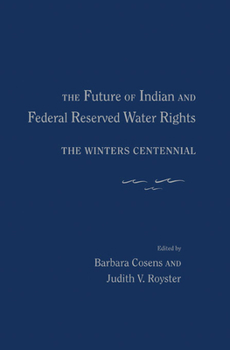The Future of Indian and Federal Reserved Water Rights: The Winters Centennial
Select Format
Select Condition 
Book Overview
On January 6, 1908, the Supreme Court ruled that when land is set aside for the use of Indian tribes, that reservation of land includes reserved water rights. The Winters Doctrine, as it has come to be known, is now a fundamental principle of both federal Indian law and water law and has expanded beyond Indian reservations to include all federal reservations of land. Ordinarily, there would not be much to say about a one hundred-year-old Supreme Court case. But while its central conclusion that a claim to water was reserved when the land was reserved for Indians represents a commitment to justice, the exact nature of that commitment--its legal basis, scope, implications for non-Indian water rights holders, the purposes for and quantities of water reserved, the geographic nexus between the land and the water reserved, and many other details of practical consequence--has been, and continues to be, litigated and negotiated. In this detailed collection of essays, lawyers, historians, and tribal leaders explore the nuances of these issues and legacies.
Format:Hardcover
Language:English
ISBN:0826351220
ISBN13:9780826351227
Release Date:June 2012
Publisher:University of New Mexico Press
Length:386 Pages
Weight:1.50 lbs.
Dimensions:1.2" x 6.3" x 9.4"
Customer Reviews
0 rating





